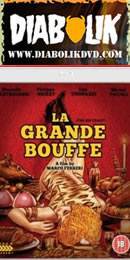
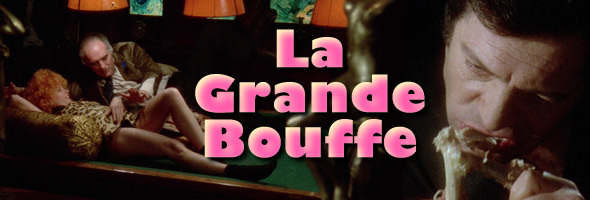
Color, 1973, 130m.
Directed by Marco Ferreri
Starring Marcello Mastroianni, Michel Piccoli, Philippe Noiret, Ugo Tognazzi, Andréa Ferréol
Arrow (Blu-ray & DVD) (US/UK RA/B HD and R1/R2 NTSC) / WS (1.66:1) (16:9), Nouveaux (UK R1 PAL) / WS (1.78:1) (16:9), Image (US R1 NTSC)
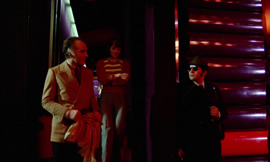
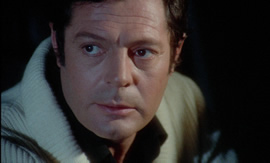
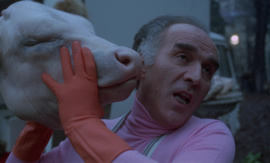 Mastroianni's more carnal scenes are still a little surreal considering the international prestige value of the actor himself. The opportunity to observe four of Europe's finest actors at the peak of their form is an opportunity to be cherished all by itself, and Ferreri relishes the opportunity to simply train his camera on his performers and let them go to work. The film obviously had a heavy influence on Peter Greenaway, who provided a very similar leading role for Ferreol in his A Zed and Two Noughts and duplicated this film's gimmick of naming its protagonists after the actors portraying them
Mastroianni's more carnal scenes are still a little surreal considering the international prestige value of the actor himself. The opportunity to observe four of Europe's finest actors at the peak of their form is an opportunity to be cherished all by itself, and Ferreri relishes the opportunity to simply train his camera on his performers and let them go to work. The film obviously had a heavy influence on Peter Greenaway, who provided a very similar leading role for Ferreol in his A Zed and Two Noughts and duplicated this film's gimmick of naming its protagonists after the actors portraying them 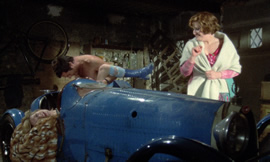 in The Cook, the Thief, His Wife and Her Lover (though three of the original actors eventually dropped out of the latter project), which shares a similar fixation with the relationship between food, sex, and death. Ferreri's semi-regular composer, Philippe Sarde, contributes another sparse, intelligent score eventually released as part of a Ferreri compilation.
in The Cook, the Thief, His Wife and Her Lover (though three of the original actors eventually dropped out of the latter project), which shares a similar fixation with the relationship between food, sex, and death. Ferreri's semi-regular composer, Philippe Sarde, contributes another sparse, intelligent score eventually released as part of a Ferreri compilation. 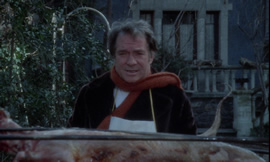 winner is the 2015 version from Arrow Films, a dual-format Blu-ray and DVD set with identical contents in the US and UK. The 1.66:1 framing is perfect, the image quality is vastly superior, and the rich, thickness of the shadows in the darker scenes now has the appropriately decaying atmosphere felt in theatrical screenings. The film has an odd texture that's both gritty and elegant with frequently odd, saturated colors, and this version does it justice with an HD rendering that should make Ferreri fans very, very happy. The optional English subtitles are excellent as well for the standard French language track, which sounds great.
winner is the 2015 version from Arrow Films, a dual-format Blu-ray and DVD set with identical contents in the US and UK. The 1.66:1 framing is perfect, the image quality is vastly superior, and the rich, thickness of the shadows in the darker scenes now has the appropriately decaying atmosphere felt in theatrical screenings. The film has an odd texture that's both gritty and elegant with frequently odd, saturated colors, and this version does it justice with an HD rendering that should make Ferreri fans very, very happy. The optional English subtitles are excellent as well for the standard French language track, which sounds great. 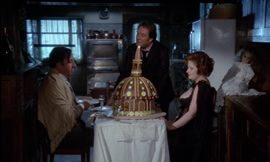
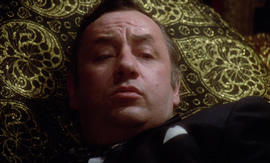 accuracy of those cartoon butts and talk about their pride in the finished film and the logistics of "the made-up sound of farts." Sarde even takes a minute to hum his main theme, too. In "Forming Ferreri," Italian film scholar Pasquale Iannone offers a new overview of the filmmaker's work up to and including this film for 18 minutes; it's a solid, informative introduction putting Ferreri in context with the other groundbreaking directors of the period, and hopefully Arrow will tackle another Ferreri title (cough cough, The Last Woman, cough cough) to pick up where this leaves off. Iannone also provides a selected audio commentary for five scenes from the film, which can either be played separately or in one 27-minute reel as he breaks down the major themes of the film and offers bios for the main actors. Finally a vintage episode of another French show, De soleil d'azur, presents Ferreri's press conference for the film's volatile Cannes screening, surrounded by the cast and running just under two minutes. Ferreri's in fiery form here as he screams at a journalist about fabricated quotes about the film's stance on consumerism. The package comes with a reversible sleeve with the original poster art and newly-commissioned artwork by Gilles Vranckx, plus a liner notes booklet with an illustrated essay by Johnny Mains. Tasty!
accuracy of those cartoon butts and talk about their pride in the finished film and the logistics of "the made-up sound of farts." Sarde even takes a minute to hum his main theme, too. In "Forming Ferreri," Italian film scholar Pasquale Iannone offers a new overview of the filmmaker's work up to and including this film for 18 minutes; it's a solid, informative introduction putting Ferreri in context with the other groundbreaking directors of the period, and hopefully Arrow will tackle another Ferreri title (cough cough, The Last Woman, cough cough) to pick up where this leaves off. Iannone also provides a selected audio commentary for five scenes from the film, which can either be played separately or in one 27-minute reel as he breaks down the major themes of the film and offers bios for the main actors. Finally a vintage episode of another French show, De soleil d'azur, presents Ferreri's press conference for the film's volatile Cannes screening, surrounded by the cast and running just under two minutes. Ferreri's in fiery form here as he screams at a journalist about fabricated quotes about the film's stance on consumerism. The package comes with a reversible sleeve with the original poster art and newly-commissioned artwork by Gilles Vranckx, plus a liner notes booklet with an illustrated essay by Johnny Mains. Tasty!